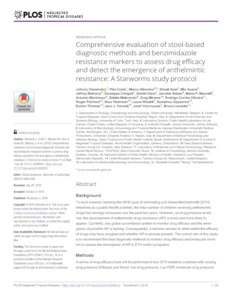Vlaminck, Johnny and Cools, Piet and Albonico, Marco and Ame, Shaali and Ayana, Mio and Bethony, Jeffrey and Cringoli, Giuseppe and Dana, Daniel and Keiser, Jennifer and Maurelli, Maria P. and Montresor, Antonio and Mekonnen, Zeleke and Mirams, Greg and Corrêa-Oliveira, Rodrigo and Prichard, Roger and Rashwan, Nour and Rinaldi, Laura and Sayasone, Somphou and Thomas, Eurion and Verweij, Jaco J. and Vercruysse, Jozef and Levecke, Bruno.
(2018)
Comprehensive evaluation of stool-based diagnostic methods and benzimidazole resistance markers to assess drug efficacy and detect the emergence of anthelmintic resistance : a Starworms study protocol.
PLoS Neglected Tropical Diseases, 12 (11).
e0006912.
![[img]](https://edoc.unibas.ch/style/images/fileicons/application_pdf.png)  Preview |
|
PDF
- Published Version
Available under License CC BY (Attribution).
939Kb |
Official URL: https://edoc.unibas.ch/66708/
Downloads: Statistics Overview
Abstract
To work towards reaching the WHO goal of eliminating soil-transmitted helminth (STH) infections as a public health problem, the total number of children receiving anthelmintic drugs has strongly increased over the past few years. However, as drug pressure levels rise, the development of anthelmintic drug resistance (AR) is more and more likely to appear. Currently, any global surveillance system to monitor drug efficacy and the emergence of possible AR is lacking. Consequently, it remains unclear to what extent the efficacy of drugs may have dropped and whether AR is already present. The overall aim of this study is to recommend the best diagnostic methods to monitor drug efficacy and molecular markers to assess the emergence of AR in STH control programs.; A series of drug efficacy trials will be performed in four STH endemic countries with varying drug pressure (Ethiopia and Brazil: low drug pressure, Lao PDR: moderate drug pressure and Tanzania: high drug pressure). These trials are designed to assess the efficacy of a single oral dose of 400 mg albendazole (ALB) against STH infections in school-aged children (SAC) by microscopic (duplicate Kato-Katz thick smear, Mini-FLOTAC and FECPAKG2) and molecular stool-based diagnostic methods (quantitative PCR (qPCR)). Data will be collected on the cost of the materials used, as well as the time required to prepare and examine stool samples for the different diagnostic methods. Following qPCR, DNA samples will also be submitted for pyrosequencing to assess the presence and prevalence of single nucleotide polymorphisms (SNPs) in the β-tubulin gene. These SNPs are known to be linked to AR in animal STHs.; The results obtained by these trials will provide robust evidence regarding the cost-efficiency and diagnostic performance of the different stool-based diagnostic methods for the assessment of drug efficacy in control programs. The assessment of associations between the frequency of SNPs in the β-tubulin gene and the history of drug pressure and drug efficacy will allow the validation of these SNPs as a marker for AR in human STHs.; The trial was retrospectively registered the 7th of March 2018 on Clinicaltrials.gov (ID: NCT03465488).
| Faculties and Departments: | 09 Associated Institutions > Swiss Tropical and Public Health Institute (Swiss TPH)
09 Associated Institutions > Swiss Tropical and Public Health Institute (Swiss TPH) > Department of Medical Parasitology and Infection Biology (MPI) > Helminth Drug Development (Keiser) |
|---|
| UniBasel Contributors: | Keiser, Jennifer |
|---|
| Item Type: | Article, refereed |
|---|
| Article Subtype: | Research Article |
|---|
| Publisher: | Public Library of Science |
|---|
| ISSN: | 1935-2727 |
|---|
| e-ISSN: | 1935-2735 |
|---|
| Note: | Publication type according to Uni Basel Research Database: Journal article |
|---|
| Language: | English |
|---|
| Identification Number: | |
|---|
| edoc DOI: | |
|---|
| Last Modified: | 22 Nov 2018 13:41 |
|---|
| Deposited On: | 22 Nov 2018 13:41 |
|---|
Repository Staff Only: item control page
